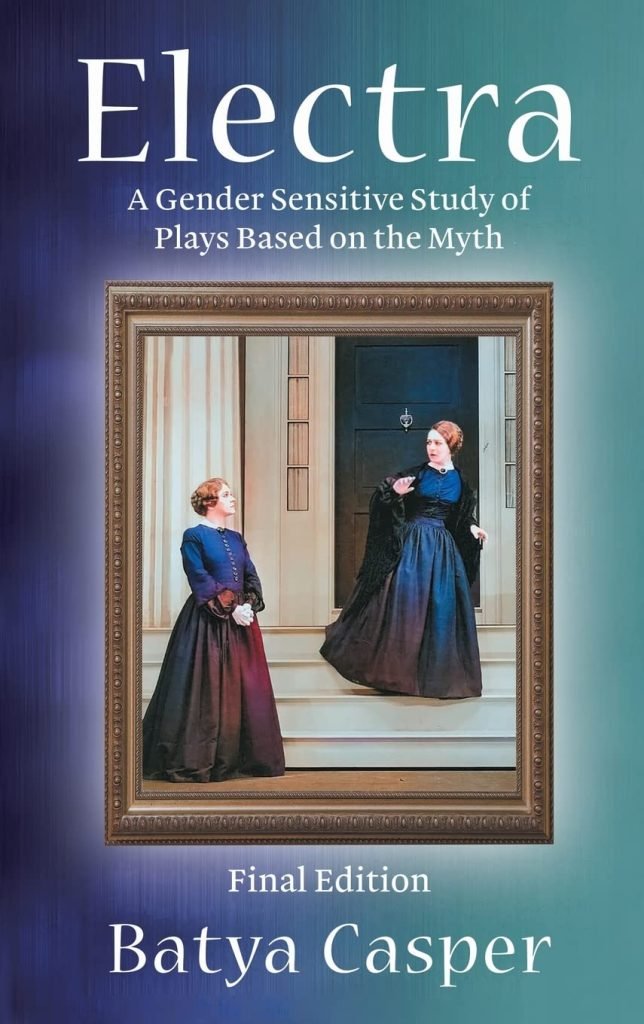
Title: Electra: A Gender Sensitive Study of the Plays Based on the Myth, 2nd ed.
Author: Batya Casper
Publisher: Inks and Bindings, LLC
ISBN: 979-8886150971
Pages: 328
Genre: Fairy Tales, Folk Tales, Legends & Mythology Literary Criticism
Reviewed by: Mihir Shah
“Perhaps, then, it is here (who knows?) for the very first time, that Sophocles has separated justice from morality.”
The duality of feminine and masculine energies has been prevalent since the beginning of time, but it has never been as magnified as it is within the prism of mythology. In Casper’s work, audiences have the opportunity to explore and break down the numerous variations of the Greek tragedy, Electra, as they pertain to the passionate and free feminine metaphor juxtaposed with the male metaphor of control and order. With the author’s obvious knack for observing and analyzing that which often goes under the radar, Casper’s work is nothing short of a plunge into a mythological universe that dissects themes such as honor, morality, and vengeance as they pertain to the culture of the times and its alignment with the norms of contemporary society.
While the traditional mythological hero is exclusively masculine, Casper’s commentary on Electra as well as the Oresteia trilogy, including Agamemnon, The Libation Bearers, and Eumenides, probes two profound questions revolving around a feminine antihero: “Is Clytemnestra a heroine, a demon, or a victim? How similar or different is Clytemnestra the woman from us?” Without question, Electra is one of the more compelling figures of Greek mythology, turning the heroic paradigm on its head and fueling a scintillating dramatization of a character who embodies a fusion of righteousness and hysteria. She is a character that has compelled renditions from the iconic authors of Greek tragedy: Euripides, Aeschylus, and Sophocles. Each translation speaks to the evolving socio-cultural times, deciphering the actions of Electra from the role of an adoring sister to a vengeful daughter driven to matricide. Digging even deeper, Casper demonstrates the role of gods in the actions of humans, specifically citing Agamemnon’s decision to follow the will of the gods and sacrifice his daughter Iphigenia as a catalyst to initiating the Trojan War.
Succinctly written and impeccably researched, Casper’s study examines not only the character of Electra but also many key components and notions of early civilization. For instance, she discusses ancient Egyptian creation myths that depict the sky as feminine. Similarly, she demonstrates how the origins of the word “virgin” were not sexual but rather indicative of an emotional independence of the feminine from the masculine. At the core of many myths is the female’s role as the Great Mother, the ultimate life force, a nurturing vessel with which the male seeks a connection. To further delve into the role of women in early Greek societies, Casper cites from Michael Grant’s In the Rise of the Greeks to help readers understand the Greek view on marriage as a “taming” of a woman’s otherwise unrestrainable and frenetic energies.
Perhaps what makes this study so intriguing is its ability to seamlessly examine all angles of the various interpretations, even the psychological angles, through the incorporation of Nietzsche and Jung. Through the adaptations, the audience will find that human suffering comes in various shapes, and often, the world of ideologies and gods exacerbates that suffering. While it makes for riveting theater, Electra’s choices are unenviable, whether pursuing a justice that will never be or justifying how it would be okay for her to kill Clytemnestra while completely overlooking Clytemnestra’s vengeance for her own sacrificed daughter as the source of Agamemnon’s demise. The deeper one probes, the more complex the web of morality becomes, making for incredible theater and drama. At a microscopic level, mythology is a recording of the cultures’ human struggle at the time. What Casper’s study ponders with pinpoint precision, and what makes her work an absolute must-read for all audiences who seek a deeper understanding of culture and story, is how modern worldviews might have changed had even one major culture from the past thought to have a balanced masculine and feminine account of human struggle rather than a male-oriented one.
RECOMMENDED by the US Review
